Steve+Kang
-
 KAIST's Partnership Agreement with the Imperial College of Science, Technology and Medicine, UK
KAIST signed an agreement on academic and research cooperation with the Imperial College of Science, Technology (Imperial College London) and Medicine in the United Kingdom (UK) on November 6th, 2013 in London.
The two universities have been implementing collaboration programs at the department level in the areas of plastic electronics since September 2012 and systems engineering and molecular simulation since February 2013, but have never had a formal partnership agreement.
President Steve Kang from KAIST and Provost James Stirling from Imperial College London signed the comprehensive cooperation agreement which will not only strengthen the existing collaborations between the two institutions but also explore areas of mutual interest in the interdisciplinary study of big data, as well as in the fields of mechanical engineering, synthetic biology, and quantum physics.
Workshops, seminars, lectures, and conferences will be jointly organized and held to facilitate the exchange of research staff and faculty and to promote collaborations in research assignments. The universities will also look into the possibility of exchange programs for undergraduate and graduate students.
The partnership agreement will be effective for five years.
Minister Moon-Gi Choi from the Republic of Korea’s Ministry of Science, Information and Communications Technology (ICT) & Future Planning attended the signing ceremony as well and congratulated the establishment of the partnership, saying:
“We are living in the age of highly advanced science and technology that requires us to have a new economic development paradigm for sustainable growth. Through convergence research based on the application of ICT and technology innovation, we will have new opportunities for development. I hope KAIST and the Imperial College London will be at the forefront of such endeavors in coming years.”With its history spanning over 100 years, the Imperial College London is a public research university located in London, UK, specializing in science, engineering, medicine, and business. The university is regarded as being one of the most prestigious universities in the world, having eminent alumni such as Thomas Henry Huxley (biologist), H.G. Wells (author), and Sir Alexander Fleming (pharmacologist).
From left to right: Provost James Stirling, Minister Moon-Gi Choi, and President Steve Kang
2013.11.12 View 10357
KAIST's Partnership Agreement with the Imperial College of Science, Technology and Medicine, UK
KAIST signed an agreement on academic and research cooperation with the Imperial College of Science, Technology (Imperial College London) and Medicine in the United Kingdom (UK) on November 6th, 2013 in London.
The two universities have been implementing collaboration programs at the department level in the areas of plastic electronics since September 2012 and systems engineering and molecular simulation since February 2013, but have never had a formal partnership agreement.
President Steve Kang from KAIST and Provost James Stirling from Imperial College London signed the comprehensive cooperation agreement which will not only strengthen the existing collaborations between the two institutions but also explore areas of mutual interest in the interdisciplinary study of big data, as well as in the fields of mechanical engineering, synthetic biology, and quantum physics.
Workshops, seminars, lectures, and conferences will be jointly organized and held to facilitate the exchange of research staff and faculty and to promote collaborations in research assignments. The universities will also look into the possibility of exchange programs for undergraduate and graduate students.
The partnership agreement will be effective for five years.
Minister Moon-Gi Choi from the Republic of Korea’s Ministry of Science, Information and Communications Technology (ICT) & Future Planning attended the signing ceremony as well and congratulated the establishment of the partnership, saying:
“We are living in the age of highly advanced science and technology that requires us to have a new economic development paradigm for sustainable growth. Through convergence research based on the application of ICT and technology innovation, we will have new opportunities for development. I hope KAIST and the Imperial College London will be at the forefront of such endeavors in coming years.”With its history spanning over 100 years, the Imperial College London is a public research university located in London, UK, specializing in science, engineering, medicine, and business. The university is regarded as being one of the most prestigious universities in the world, having eminent alumni such as Thomas Henry Huxley (biologist), H.G. Wells (author), and Sir Alexander Fleming (pharmacologist).
From left to right: Provost James Stirling, Minister Moon-Gi Choi, and President Steve Kang
2013.11.12 View 10357 -
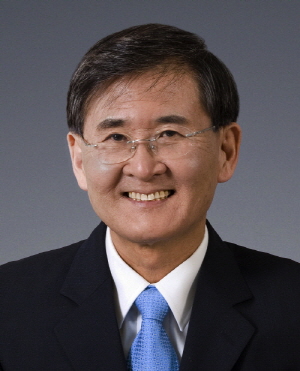 The World Economic Forum Invites KAIST to 2014 Davos Forum
President Steve Kang and Distinguished Professor Sang Yup Lee have been invited by the World Economic Forum (WEF) to attend its annual meeting slated for January 22-25, 2014 in Davos-Klosters, Switzerland.
The president will also join the Global University Leaders Forum (GULF) to be held during the annual meeting. The GULF consists of leading research universities throughout the world, at which President Kang will address agenda related to higher education and research.
From September 11th to 13th, KAIST was invited to the WEF’s 2013 Summer Davos Forum held in Dalian, China. The Summer Davos Forum is recognized as a barometer of the world economy, and KAIST hosted three sessions there.
In a session titled “Smart Regulations,” Professor Sang Yup Lee hosted presentations and discussions under the topic of “How regulation models can strengthen technical innovation and expansion.” President Steve Kang, Peter Sands, CEO of Standard Chartered Bank Group, Mark Weinberger, CEO of Ernest & Young, and Peter Terium, CEO of RWE, participated in the discussions.
The KAIST delegates also presented and participated in a session titled “From Trade Center to Innovative Hub” to discuss how to lead innovations in Asia, as well as “Marine Resources: Finding New Frontier” to address issues of how to develop and manage oceanic resources for potential growth.
President Kang said, “The World Economic Forum allows us to introduce the results of our innovative and creative research to global leaders and to demonstrate that our global position continues to grow.”
The WEF has been hosting Summer Davos Forum in China since 2007. About 1,500 participants from over 90 countries joined in this year’s summer forum under the theme of “Innovation: Inevitable Mainstream.” New strategies for innovations and solutions for global threats were suggested through presentations and discussions in 125 sessions.
The World Economic Forum (WEF) is an independent, international, and non-profit organization based in Geneva, Switzerland. It is committed to improving the state of the world by engaging business, political, academic, and government leaders to shape global, regional and industry agenda.
Among the meetings and forums organized by the WEF, its annual meeting held each January in Davos, a.k.a. the Davos Forum, has been the best known gathering. The Davos Forum brings together some 2,500 top business leaders, international political leaders, selected intellectuals and journalists to discuss the most pressing issues facing the world including health and environment.
2013.11.07 View 12546
The World Economic Forum Invites KAIST to 2014 Davos Forum
President Steve Kang and Distinguished Professor Sang Yup Lee have been invited by the World Economic Forum (WEF) to attend its annual meeting slated for January 22-25, 2014 in Davos-Klosters, Switzerland.
The president will also join the Global University Leaders Forum (GULF) to be held during the annual meeting. The GULF consists of leading research universities throughout the world, at which President Kang will address agenda related to higher education and research.
From September 11th to 13th, KAIST was invited to the WEF’s 2013 Summer Davos Forum held in Dalian, China. The Summer Davos Forum is recognized as a barometer of the world economy, and KAIST hosted three sessions there.
In a session titled “Smart Regulations,” Professor Sang Yup Lee hosted presentations and discussions under the topic of “How regulation models can strengthen technical innovation and expansion.” President Steve Kang, Peter Sands, CEO of Standard Chartered Bank Group, Mark Weinberger, CEO of Ernest & Young, and Peter Terium, CEO of RWE, participated in the discussions.
The KAIST delegates also presented and participated in a session titled “From Trade Center to Innovative Hub” to discuss how to lead innovations in Asia, as well as “Marine Resources: Finding New Frontier” to address issues of how to develop and manage oceanic resources for potential growth.
President Kang said, “The World Economic Forum allows us to introduce the results of our innovative and creative research to global leaders and to demonstrate that our global position continues to grow.”
The WEF has been hosting Summer Davos Forum in China since 2007. About 1,500 participants from over 90 countries joined in this year’s summer forum under the theme of “Innovation: Inevitable Mainstream.” New strategies for innovations and solutions for global threats were suggested through presentations and discussions in 125 sessions.
The World Economic Forum (WEF) is an independent, international, and non-profit organization based in Geneva, Switzerland. It is committed to improving the state of the world by engaging business, political, academic, and government leaders to shape global, regional and industry agenda.
Among the meetings and forums organized by the WEF, its annual meeting held each January in Davos, a.k.a. the Davos Forum, has been the best known gathering. The Davos Forum brings together some 2,500 top business leaders, international political leaders, selected intellectuals and journalists to discuss the most pressing issues facing the world including health and environment.
2013.11.07 View 12546 -
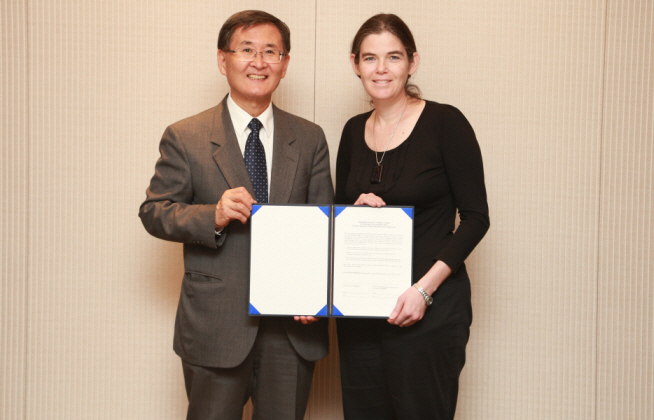 KAIST's classes now available to take from all around the world
Signed a partnership agreement with Coursera to provide millions of people with online courses in science and technology.
The Korea Advanced Institute of Science and Technology (KAIST), a world-leading research university focusing on science, engineering and technology, joined a new, online platform for open access that serves the needs of Korean and global learners.
KAIST and Coursera, the world"s largest provider of massive open online courses (MOOCs), agreed on October 14th, 2013 to partner for the provision of internet-based open learning, through which the university expects to reinforce its current education initiative, Education 3.0.Steve Kang, president of KAIST, was upbeat about the partnership."We know the benefits and importance of online education that will significantly impact the landscape of today"s higher education. Hopefully, our partnership with Coursera will expand our initiative to continuously provide quality education globally."
With its network of 107 prestigious partner universities and public institutions worldwide, Coursera offers 482 free online courses across a wide field of humanities, science, engineering, and business to 5 million students around the globe.
KAIST will be able to utilize top-notch online courses and lecture contents available on the company"s website. The university can also supply its online courses to the global community, allowing the faculty"s top quality lectures to reach hundreds and thousands of students and adult learners throughout the world.Incorporating advanced information and communications technology, KAIST has implemented a new, smart education program, Education 3.0, since 2012 to effectively meet the growing demands of creating a better and more interactive learning and teaching environment for students and faculty. Under Education 3.0, students study online and meet in groups with a professor for discussions and problem solving.
Tae-Eog Lee, Director of the Center for Excellence in Learning & Teaching at KAIST, said:"We received a phenomenal response from students and professors to the courses made available under Education 3.0. For this year alone, we are offering 60 courses, such classes as calculus, general biology, basic programming, design and communication, bioengineering fundamentals, and logic and artificial intelligence."
Professor Lee added:"It has turned out that our education initiative is not only useful to our students but also quite popular among learners outside the university and Korea. It"s a great thing that KAIST can contribute to the world"s concerted efforts to provide equal opportunities for learning. At the same time, we look forward to seeing the benefits of MOOC-based content being used in our classrooms."
Founded in 2012 by two eminent Stanford University professors, Coursera has held a strong lead in MOOCs. Unlike the traditional online education model, open courseware (OCW), designed for simply sharing lecture materials including videos, slides, and data through the internet, MOOCs develop and evaluate courses, lecture contents, and delivery quality to meet high academic standards—In order to earn credits, subscribers (universities and students) are required to submit course registration, specification, and description; student attendance roster; homework and assignments; and assessment.
Daphne Koller, co-founder of Coursera, commented on the partnership agreement with KAIST:"We are honored to have so many brilliant minds working together to expand educational opportunities globally. To be able to offer courses from professors at the forefront of their fields to millions of people is truly remarkable, and our students remind us daily of the value of spreading this knowledge globally."
Among the partner universities and institutions are Stanford University, California Institute of Technology, Columbia University, École Polytechnique Fédérale de Lausanne, Technion-Israel Institute of Technology, the National University of Singapore, the University of Tokyo, the World Bank, and Shanghai Jiao Tong University.
President Steve Kang (in the left) singed a partnership agreement with Dr. Daphne Koller (in the right), president and CEO of Coursera.
2013.11.04 View 10882
KAIST's classes now available to take from all around the world
Signed a partnership agreement with Coursera to provide millions of people with online courses in science and technology.
The Korea Advanced Institute of Science and Technology (KAIST), a world-leading research university focusing on science, engineering and technology, joined a new, online platform for open access that serves the needs of Korean and global learners.
KAIST and Coursera, the world"s largest provider of massive open online courses (MOOCs), agreed on October 14th, 2013 to partner for the provision of internet-based open learning, through which the university expects to reinforce its current education initiative, Education 3.0.Steve Kang, president of KAIST, was upbeat about the partnership."We know the benefits and importance of online education that will significantly impact the landscape of today"s higher education. Hopefully, our partnership with Coursera will expand our initiative to continuously provide quality education globally."
With its network of 107 prestigious partner universities and public institutions worldwide, Coursera offers 482 free online courses across a wide field of humanities, science, engineering, and business to 5 million students around the globe.
KAIST will be able to utilize top-notch online courses and lecture contents available on the company"s website. The university can also supply its online courses to the global community, allowing the faculty"s top quality lectures to reach hundreds and thousands of students and adult learners throughout the world.Incorporating advanced information and communications technology, KAIST has implemented a new, smart education program, Education 3.0, since 2012 to effectively meet the growing demands of creating a better and more interactive learning and teaching environment for students and faculty. Under Education 3.0, students study online and meet in groups with a professor for discussions and problem solving.
Tae-Eog Lee, Director of the Center for Excellence in Learning & Teaching at KAIST, said:"We received a phenomenal response from students and professors to the courses made available under Education 3.0. For this year alone, we are offering 60 courses, such classes as calculus, general biology, basic programming, design and communication, bioengineering fundamentals, and logic and artificial intelligence."
Professor Lee added:"It has turned out that our education initiative is not only useful to our students but also quite popular among learners outside the university and Korea. It"s a great thing that KAIST can contribute to the world"s concerted efforts to provide equal opportunities for learning. At the same time, we look forward to seeing the benefits of MOOC-based content being used in our classrooms."
Founded in 2012 by two eminent Stanford University professors, Coursera has held a strong lead in MOOCs. Unlike the traditional online education model, open courseware (OCW), designed for simply sharing lecture materials including videos, slides, and data through the internet, MOOCs develop and evaluate courses, lecture contents, and delivery quality to meet high academic standards—In order to earn credits, subscribers (universities and students) are required to submit course registration, specification, and description; student attendance roster; homework and assignments; and assessment.
Daphne Koller, co-founder of Coursera, commented on the partnership agreement with KAIST:"We are honored to have so many brilliant minds working together to expand educational opportunities globally. To be able to offer courses from professors at the forefront of their fields to millions of people is truly remarkable, and our students remind us daily of the value of spreading this knowledge globally."
Among the partner universities and institutions are Stanford University, California Institute of Technology, Columbia University, École Polytechnique Fédérale de Lausanne, Technion-Israel Institute of Technology, the National University of Singapore, the University of Tokyo, the World Bank, and Shanghai Jiao Tong University.
President Steve Kang (in the left) singed a partnership agreement with Dr. Daphne Koller (in the right), president and CEO of Coursera.
2013.11.04 View 10882 -
 KAIST ranked 60th in the 2013 QS World University Rankings
KAST achieved the highest ranking in its history in the QS World University Rankings by Quacquarelli Symonds.
The British company, which specializes in education, has ranked KAIST 60th in the world in its 2013 QS World University Rankings, as announced on its homepage on September 10th. KAIST was ranked 198th in 2006 and was promoted to 63rd in 2012.
This year, MIT was first, followed by Harvard in second, Cambridge in third, University College of London in fourth, and Imperial College in fifth.
Seoul National University, in 35th place, was ranked the highest among Korean universities. Six other Korean universities were included in the top 200, including KAIST, POSTECH which ranked 107th, Yonsei University in 114th place, Korea University in 145th, and Sungkyunkwan University in 162nd.
QS World University Rankings are assessed based on six different criteria: academic reputation (40%), citations per faculty (20%), student-to-faculty ratio (20%), employer reputation (10%), international student ratio (5%), and foreign faculty ratio (5%).
KAIST improved over 10 points from last year in the areas of employer reputation and citations per faculty.
“This has been accomplished through the challenging spirit and passion of the KAIST family including the students and the faculty. All possible support will be provided for them to excel in research and education”, said the president, Steve Kang.
KAIST also ranked sixth in the 2013 Chosun Daily Newspaper Asian University Rankings and first in the Chungang Daily Newspaper University Rankings for five years from 2008 to 2012.
2013.11.04 View 6710
KAIST ranked 60th in the 2013 QS World University Rankings
KAST achieved the highest ranking in its history in the QS World University Rankings by Quacquarelli Symonds.
The British company, which specializes in education, has ranked KAIST 60th in the world in its 2013 QS World University Rankings, as announced on its homepage on September 10th. KAIST was ranked 198th in 2006 and was promoted to 63rd in 2012.
This year, MIT was first, followed by Harvard in second, Cambridge in third, University College of London in fourth, and Imperial College in fifth.
Seoul National University, in 35th place, was ranked the highest among Korean universities. Six other Korean universities were included in the top 200, including KAIST, POSTECH which ranked 107th, Yonsei University in 114th place, Korea University in 145th, and Sungkyunkwan University in 162nd.
QS World University Rankings are assessed based on six different criteria: academic reputation (40%), citations per faculty (20%), student-to-faculty ratio (20%), employer reputation (10%), international student ratio (5%), and foreign faculty ratio (5%).
KAIST improved over 10 points from last year in the areas of employer reputation and citations per faculty.
“This has been accomplished through the challenging spirit and passion of the KAIST family including the students and the faculty. All possible support will be provided for them to excel in research and education”, said the president, Steve Kang.
KAIST also ranked sixth in the 2013 Chosun Daily Newspaper Asian University Rankings and first in the Chungang Daily Newspaper University Rankings for five years from 2008 to 2012.
2013.11.04 View 6710 -
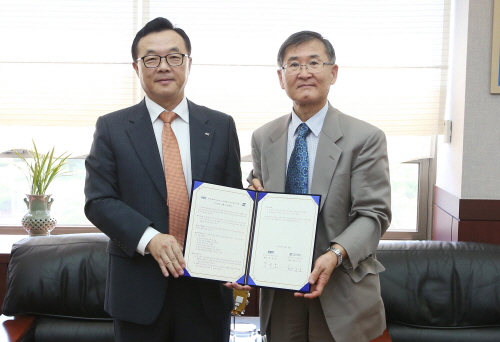 Collaboration with Korea Institute of Energy Research
KAIST and the Korea Institute of Energy Research (KIER) agreed on September 4th to further collaboration on energy research such as the development of nano-based hybrid solar cells, bio-fuels, artificial photosynthesis, and carbon dioxide reduction.
The two institutions will select 11 research projects to focus on their cooperation. President Steve Kang (in the right) stood with Jooho Whang, the president of KIER (in the left), holding the signed memorandum of understanding.
2013.11.04 View 9177
Collaboration with Korea Institute of Energy Research
KAIST and the Korea Institute of Energy Research (KIER) agreed on September 4th to further collaboration on energy research such as the development of nano-based hybrid solar cells, bio-fuels, artificial photosynthesis, and carbon dioxide reduction.
The two institutions will select 11 research projects to focus on their cooperation. President Steve Kang (in the right) stood with Jooho Whang, the president of KIER (in the left), holding the signed memorandum of understanding.
2013.11.04 View 9177 -
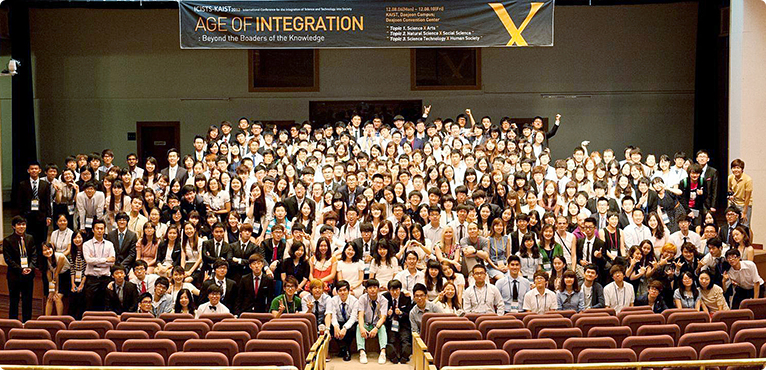 2013 International Conference for the Integration of Science, Technology, and Society at KAIST (ICISTS-KAIST)
The International Conference for the Integration of Science, Technology, and Society at KAIST (ICISTS-KAIST) is a global forum organized by KAIST undergraduate students to promote the exchange of ideas and facilitate the discussion of issues that are important to science, technology, society, and higher education. The ICISTS-KAIST conference has been held annually every summer since 2005, inviting distinguished speakers and guests from all around the world to share their insights and expertise with students gathered from Korea and abroad. Last year alone, more than 300 students from 22 nations and 40 speakers participated in the event.
Originally, the ICISTS-KAIST was established by KAIST students who were inspired by the Harvard Project for Asian and International Relations (HPAIR), which is one of the Harvard’s largest annual student conferences in Asia.
This year, 335 students from 103 universities in 22 countries joined the conference that was held on August 5th-9th in Daejeon, making the 2013 ICISTS-KAIST the biggest science and engineering gathering hosted by university students in Asia. About 36% of the participants were international students.
The theme of the conference was “Perfect Alliance: Coexistence for Human Society,” in which students and speakers addressed issues on how to harmonize the speed of scientific progress with the development of important values in society, as well as to explore solutions to overcome the chasm, if any, between the boundaries of science and society.
In his opening remarks, President Steve Kang said, “Creativity and innovation are born out of openness. Therefore, it is essential for young scientists and engineers to communicate with people from different cultural and political backgrounds. Through this kind of global interaction and exchange of ideas and views, students will have an opportunity to deepen their understanding of the world and to better examine the purpose of their intellectual exploration in science and technology.” At the 2013 ICISTS-KAIST, 25 distinguished speakers participated including Walter Bender, a former director of the Media Lab at MIT and David Christian, a professor of Macquarie University in Australia.
2013.08.08 View 12034
2013 International Conference for the Integration of Science, Technology, and Society at KAIST (ICISTS-KAIST)
The International Conference for the Integration of Science, Technology, and Society at KAIST (ICISTS-KAIST) is a global forum organized by KAIST undergraduate students to promote the exchange of ideas and facilitate the discussion of issues that are important to science, technology, society, and higher education. The ICISTS-KAIST conference has been held annually every summer since 2005, inviting distinguished speakers and guests from all around the world to share their insights and expertise with students gathered from Korea and abroad. Last year alone, more than 300 students from 22 nations and 40 speakers participated in the event.
Originally, the ICISTS-KAIST was established by KAIST students who were inspired by the Harvard Project for Asian and International Relations (HPAIR), which is one of the Harvard’s largest annual student conferences in Asia.
This year, 335 students from 103 universities in 22 countries joined the conference that was held on August 5th-9th in Daejeon, making the 2013 ICISTS-KAIST the biggest science and engineering gathering hosted by university students in Asia. About 36% of the participants were international students.
The theme of the conference was “Perfect Alliance: Coexistence for Human Society,” in which students and speakers addressed issues on how to harmonize the speed of scientific progress with the development of important values in society, as well as to explore solutions to overcome the chasm, if any, between the boundaries of science and society.
In his opening remarks, President Steve Kang said, “Creativity and innovation are born out of openness. Therefore, it is essential for young scientists and engineers to communicate with people from different cultural and political backgrounds. Through this kind of global interaction and exchange of ideas and views, students will have an opportunity to deepen their understanding of the world and to better examine the purpose of their intellectual exploration in science and technology.” At the 2013 ICISTS-KAIST, 25 distinguished speakers participated including Walter Bender, a former director of the Media Lab at MIT and David Christian, a professor of Macquarie University in Australia.
2013.08.08 View 12034 -
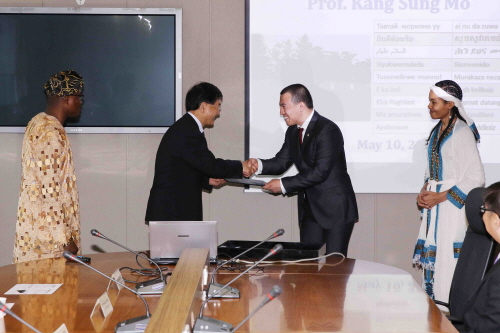 Foreign graduates donate to development fund for six years
International graduates of the Global IT Technology Graduate School at KAIST have continued a tradition of giving something back to their alma mater.
On May 10th, President Steve Kang held a donation ceremony with 12 donors.
Started in 2008, the graduates, mostly consisted of government officials from developing countries, have raised a development fund for KAIST, and in the past six years, a total of 81 graduates donated USD 10,000.
“KAIST provided me with an excellent education and research environment during my studies. I’m glad that I can have an opportunity to help my juniors and the university,” said Naryn Kenzhaliyev of Kazakhstan, a graduate present at the ceremony.
“Every year, these students voluntarily give when they are about to graduate. We feel proud and greatly appreciated for their philanthropic efforts,” said Professor Jae-Jung Noh, responsible for the global IT technology graduate program.
Established in 2006, the Global IT Technology Graduate School has attracted IT specialists from Korea and abroad, offering master’s and doctoral degrees. The school has invited many public servants in developing countries whose expertise lies in IT technology.
2013.07.04 View 7129
Foreign graduates donate to development fund for six years
International graduates of the Global IT Technology Graduate School at KAIST have continued a tradition of giving something back to their alma mater.
On May 10th, President Steve Kang held a donation ceremony with 12 donors.
Started in 2008, the graduates, mostly consisted of government officials from developing countries, have raised a development fund for KAIST, and in the past six years, a total of 81 graduates donated USD 10,000.
“KAIST provided me with an excellent education and research environment during my studies. I’m glad that I can have an opportunity to help my juniors and the university,” said Naryn Kenzhaliyev of Kazakhstan, a graduate present at the ceremony.
“Every year, these students voluntarily give when they are about to graduate. We feel proud and greatly appreciated for their philanthropic efforts,” said Professor Jae-Jung Noh, responsible for the global IT technology graduate program.
Established in 2006, the Global IT Technology Graduate School has attracted IT specialists from Korea and abroad, offering master’s and doctoral degrees. The school has invited many public servants in developing countries whose expertise lies in IT technology.
2013.07.04 View 7129 -
 Thinking Out of the Box: KAIST Silicon Valley Innovation Platform
KAIST established a liaison office in San Jose, California, to support the entrepreneurship of KAIST graduates, students, and faculty who aspire to transform their innovative ideas into business.
The office, KAIST Silicon Valley Innovation Platform (SVIP), is located within the Korea Trade-Investment Promotion Agency (KOTRA) IT Center on North First Street in San Jose.
SVIP collects information and analyzes trends on emerging technologies; provides various educational programs on entrepreneurship and technology translation; offers opportunities to prospective entrepreneurs to engage with industry and research and government organizations; and assists Korean startups in accessing the US and North American market.
President Steve Kang attended the opening ceremony of the office on June 14th and encouraged KAIST alumni living in the US to share their ideas and technology innovations and transform them into business opportunities.
For more information, please contact Professor Soung-Hie Kim (seekim@business.kaist.ac.kr) from the Graduate School of Information and Media Management, KAIST.
2013.07.04 View 9865
Thinking Out of the Box: KAIST Silicon Valley Innovation Platform
KAIST established a liaison office in San Jose, California, to support the entrepreneurship of KAIST graduates, students, and faculty who aspire to transform their innovative ideas into business.
The office, KAIST Silicon Valley Innovation Platform (SVIP), is located within the Korea Trade-Investment Promotion Agency (KOTRA) IT Center on North First Street in San Jose.
SVIP collects information and analyzes trends on emerging technologies; provides various educational programs on entrepreneurship and technology translation; offers opportunities to prospective entrepreneurs to engage with industry and research and government organizations; and assists Korean startups in accessing the US and North American market.
President Steve Kang attended the opening ceremony of the office on June 14th and encouraged KAIST alumni living in the US to share their ideas and technology innovations and transform them into business opportunities.
For more information, please contact Professor Soung-Hie Kim (seekim@business.kaist.ac.kr) from the Graduate School of Information and Media Management, KAIST.
2013.07.04 View 9865